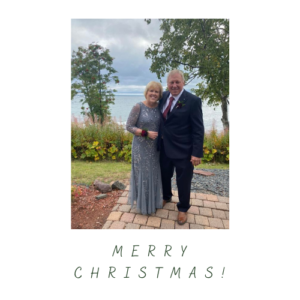
Another Christmas holiday season has arrived. And everyone who likes lots of very crispy weather mixed with a mix of snow and wind will not be disappointed. Simon Atkins releases his temperature predictions in four-day increments and he has been calling for temperatures for the Midwest at 12 to 14 degrees below normal. Those are levels matching the extreme chills or 2002 thru 2003. So be sure to dress and pack for extreme cold and plan to spend more time outside in case something unexpected occurs happens to your vehicle or to your travel plans.
Here is wishing everyone a good holiday season which means time with your family members, as holiday events and in your churches. Remember what this Holy Day commemorates and share the message with those who don’t know the full stories. For families that has members living over a broad geography, and have to deal with in-laws and outlaws making it to all parties can be a challenge. So, enjoy singing the normal Christmas Hymns and Songs and may all of you have a good holiday season.
So, what are the chores that need to be done by the farmers who will be involved in: getting educated and updated on new products; trying to negotiate the myriad of seed selection; making decisions about each field as to fertility needs, making the calculations as to needs, and the sourcing the best fertilizer for the costs; and finally making any updates or modification to equipment already owned or possibly to adding modernizing to equipment in need of replacement. These are time consuming and complicated work in a normal season. And the lead up to the 2023 preparations will be complicated by product shortfalls and inability to be guaranteed fulfillment of your order on a timely basis.
Within a normal first half of December digging up a topic or series of topics to discuss or write about is easy. This year orchestrating our crop conference held in Webster City on Dec 7th and 8th ate up our days and weeks. I will cover what we learned and what our invited speakers covered. We ended up hosting a well-attended conference with 180 to 190 people from 13 different states in the building on the Briggs Wood’s Golf Course. It is a grand venue with everything available to have your presentation seen and heard.
The first speaker up was Dr Richard Olree, a national known chiropractor talking about the role of the major and important minerals instrumental to producing fields of healthy plants that maximize yields that resultingly provide proper nourishment to the end consumer during the next year to the consuming animals or the persons who eat meat from the animals. His message was that the university and fertilizer retailers for years were focusing mostly on a yearly or semiannual application of N-P-K only. In recent seasons more have been paying attention to Zn and S. His knowledge of all the minerals and their roles in keeping the plants, people and animals healthy is deep and broad and he impressed that on people in attendance.
Dr. Allan Lindsley of Bloomer, Wisc is another Chiropractor, biochemist, human physiologist and mechanical engineer we have hosted before. He has been focusing on the effects of stress on human health and has developed a treatment program that people can follow. His message was that raising crops and animals as well as running a farming operation generates so many uncertainties that are further complicated by uncooperative weather makes many farming couples wake up in the middle of the night wondering how they can tackle all of their challenges. He was very well received and both worked on attendees is private rooms.
A lady microbiologist from Kentucky accepted our invitation and spoke. Martha Carlin changed careers after her 40-year young marathoner husband was diagnosed with Parkinson’s to devote her time and activity trying to discover how to manage and treat his illness. This is an illness or syndrome that is increasingly common in Nebraska’s Platte River Valley where pesticide use in their high population irrigated corn fields is heavy and the water table is close to the soil surface. This got her studying both mineral nutrition, focusing mainly on copper and manganese, and then on microbials important to getting them into the right tissue in the body. Using deep sea soil cores and sleuthing preserved amber she discovered several species of Lactobacillus bacteria capable of degrading the #1 used herbicide and its metabolites. When there has been heavy use of this product it can accumulate at levels where it ties up the minerals needed to keep our crops healthy. There has been a lot of publicity about Tar Spot and how it can be so devastating to plant health and yields. Getting rid of the residue with an effective and affordable with microbial mix could provide the product capable of cleaning up this disease situation.
Our water research expert now from Chicago spoke about his history and development of different water treatment equipment that farmers can use in treatment of spray water or boosting plant growth by energizing water. At first glance and over 14 years ago that seemed a questionable proposal. But now after lots of ag and industry types have been able to clean up their water supplies and after he won the international inventor of the decade by the Industry Trade Council headed in Chicago his achievement and claims have been validated. As the per acre cost of postemerge herbicide has increased and their effectiveness has been challenged, the equipment from Pursanova, Inc has increased in value.
Dr Liz Haney, soil scientist of Temple, TX and Environmental Engineer Steve Apfelbaum spoke about the movement towards Regenerative Ag and how convention ag and the normal famers have found that accredited biological products have proven their value and will be even more important in their future.
The local people connected with Central Iowa Agronomy Supply and Agronomy RX, plus George Sims of CarbonWorks, and Dan Coffin, presented on the very favorable yield results seen with their use in the 2022 crops. Farmers appreciate the special attention they can receive from a number of experienced agronomists.
We had a videographer at the conference and videos of the presentations will be available to those interested is watching them. To learn more about getting a copy of the videos go HERE.
Martha Carlin had quite a few people ask for information about the probiotics and she graciously set up this discount code AGBIO15 to use when you purchase from her website: https://biotiquest.com/. If there are people interested in her Parkinson’s work they can find it here https://www.marthasquest.com. If anyone is interested in trying her glyphosate remediation product they can contact her at this email address: martha.carlin@thebiocollective.com. She still has some in the Wisconsin/Iowa area that we could provide as samples. Marv and I at Central Iowa Agronomy and Supply will be handling her Yield and Shield microbial product. Besides degrading the herbicide it was found to increase corn yields by over 10 Bu/A. That means a triple win: Higher yields; decreased disease pressure due to increased nutrient availability; decreased risk of tar spot problems.
Bob Streit is an independent crop consultant and columnist for Farm News. He can be reached at (515) 709-0143 or www.CentralIowaAg.com.

